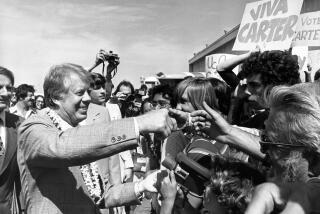It Ain’t Over Till Election Day
- Share via
WASHINGTON — The fat lady is singing just offstage, the press is packing up its word processors and James A. Baker III is getting his pin-stripe suit cleaned so he can be sworn in as secretary of state. Is next month’s vote for President just a formality? Is George Herbert Walker Bush the 41st President of the United States and Dan Quayle the vice president?
Not quite. The one consistent message the polls have given us over the last few months is that there’s a volatile electorate out there--not quite content with their choices and not quite committed to their candidate.
Bush’s current big edge in the polls may also not be that big. If the 20 safe states for Bush in the South and West are taken out of the calculation and the 25 battleground states are focused on, the margin between the candidates is reduced to 5 points. And never forget one critical fact about this race: Despite the fact that you have run a campaign way over your head, George Bush, with apologies to Lloyd Bentsen, you are no Ronald Reagan.
Michael S. Dukakis’ tasks are clear. He has now developed a populist middle class message--”George Bush cares about the people on Easy Street. I care about the people on Main Street.” He needs to repeat this message every day. Bush does not understand the middle class because he’s never been in the middle class. He’s never even been close. He doesn’t understand what average people face in finding a place to live, a decent school, a good job. Bush’s only problems have been finding places to put trust funds.
The middle class squeeze is real and will get worse. The goals of affordable housing, a college education and safe streets are getting further from the grasp of most people in this country. And they’re not likely to get closer under Bush. If the rich have done well in the last eight years, just wait until one of their own is chairman of the board.
Besides focusing his message, Dukakis needs to make some hard organizational choices. He has no time to linger. He has to move people from Southern and Rocky Mountain states--where he has little chance of winning--to states where he could gain a narrow win in the electoral college vote. There should be no more pretense of a 50-state campaign.
He also needs to re-energize his campaign workers and the elected officials who also make up the core of the Democratic Party. He must now, by his own intensity, convince the skeptics around him that he hasn’t given up and that they can’t either. He needs to start appearing at events surrounded by recognizable Democrats. The Sam Nunns and Bill Bradleys can visually show the party closing ranks behind their nominee. They can illustrate that the Duke is not out there by himself and that what’s at stake goes beyond the ambition of an individual politician.
I feel for Mike Dukakis. As the campaign manager of the Democrats’ 1984 effort, I know the sinking feeling that opens up in the stomach, after months of grinding effort, when it all seems to be crumbling. But he’s a lot closer to victory than we ever got, and there’s no reason to give up now.
A curious thing happened to Walter F. Mondale near the end of his 1984 campaign. Things came together for him. He began to find his own pace and themes. He seemed to find a new level of strength and comfort in carrying on an effort that many of us found painful. Mondale knew he was going to lose but used his last two weeks to talk personally to the American people. I think Dukakis has the inner fiber that he needs to rise to his moment--and in this instance, to make it a winning moment.
More to Read
Get the L.A. Times Politics newsletter
Deeply reported insights into legislation, politics and policy from Sacramento, Washington and beyond. In your inbox twice per week.
You may occasionally receive promotional content from the Los Angeles Times.










